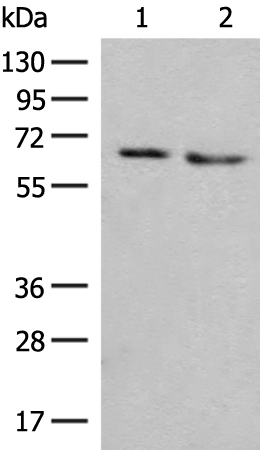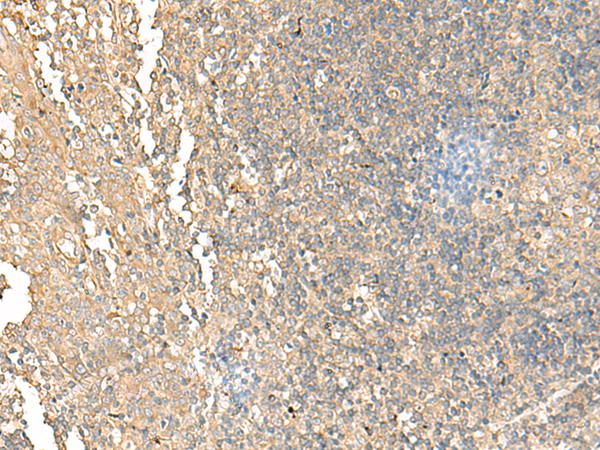

| WB | 咨询技术 | Human,Mouse,Rat |
| IF | 咨询技术 | Human,Mouse,Rat |
| IHC | 1/50-1/300 | Human,Mouse,Rat |
| ICC | 技术咨询 | Human,Mouse,Rat |
| FCM | 咨询技术 | Human,Mouse,Rat |
| Elisa | 1/5000-1/10000 | Human,Mouse,Rat |
| Aliases | NARS; ASNRS |
| WB Predicted band size | 63 kDa |
| Host/Isotype | Rabbit IgG |
| Antibody Type | Primary antibody |
| Storage | Store at 4°C short term. Aliquot and store at -20°C long term. Avoid freeze/thaw cycles. |
| Species Reactivity | Human, Mouse |
| Immunogen | Fusion protein of human NARS1 |
| Formulation | Purified antibody in PBS with 0.05% sodium azide and 50% glycerol. |
+ +
以下是关于NARS1抗体的3篇参考文献及其摘要概括:
---
1. **文献名称**:*NARS1 mutations cause autosomal recessive neurodevelopmental disorders by impairing the function of the asparaginyl-tRNA synthetase*
**作者**:Suzuki T, et al.
**摘要**:该研究通过全外显子测序发现NARS1基因突变导致神经发育障碍,利用NARS1抗体检测患者细胞中蛋白表达水平,发现突变显著降低酶活性,影响tRNA结合能力,提示其与脑发育异常相关。
---
2. **文献名称**:*Antibody-based profiling of mitochondrial aspartyl-tRNA synthetase (NARS2) reveals tissue-specific expression patterns*
**作者**:Pierce SB, et al.
**摘要**:研究开发了针对NARS家族(包括NARS1/2)的特异性抗体,通过免疫组化及Western blot分析发现NARS1在肝脏和神经元中高表达,抗体验证了其在亚细胞定位及线粒体功能研究中的应用潜力。
---
3. **文献名称**:*A novel NARS1 antibody for the diagnosis of asparaginyl-tRNA synthetase deficiency syndromes*
**作者**:Zhang Y, et al.
**摘要**:报道一种高特异性NARS1单克隆抗体的开发,通过ELISA和免疫荧光验证其在临床样本中的诊断效能,成功用于快速筛查NARS1缺乏症患者,为遗传病诊断提供新工具。
---
如需更详细文献信息,建议在PubMed或Web of Science中按标题检索。
The NARS1 antibody targets the enzyme asparaginyl-tRNA synthetase (NARS), encoded by the *NARS1* gene. This cytoplasmic enzyme is a member of the aminoacyl-tRNA synthetase (AARS) family, which plays a critical role in protein synthesis by catalyzing the attachment of asparagine to its cognate tRNA. NARS1 ensures translational fidelity and is essential for cellular function, particularly in tissues with high metabolic demands. Dysregulation or mutations in *NARS1* have been linked to neurodevelopmental disorders, including microcephaly, intellectual disability, and early-onset epilepsy, highlighting its importance in brain development.
NARS1 antibodies are widely used in research to study protein expression, subcellular localization, and molecular mechanisms in diseases. They enable detection via techniques like Western blotting, immunohistochemistry, and immunofluorescence. Commercially available NARS1 antibodies are typically developed in hosts such as rabbits or mice, with validation in specific experimental models. Recent studies also explore NARS1’s potential role beyond translation, including interactions in stress responses or signaling pathways.
These antibodies are crucial for investigating pathogenic variants in *NARS1*-related disorders and for developing diagnostic or therapeutic strategies. Researchers rely on their specificity to dissect NARS1’s functional contributions in both physiological and pathological contexts.
×